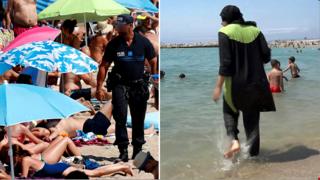 Image copyright
Image copyright
EPA/AP
The bans largely affect beaches on the French Rivera, but few towns have issued fines
France’s highest administrative court is being asked to overturn beach bans imposed by 26 towns on women in full-body swimsuits known as “burkinis”.
A human rights group and an anti-Islamophobia association argue the bans are in breach of French law.
Mayors, particularly on the Riviera, say the bans are protecting public order and rules on secularism.
Opinion polls suggest most French people back the bans but Muslims warn they are being targeted unfairly.
According to an Ifop survey, 64% of French people are in favour of the bans while another 30% are indifferent.
The bans appeared to have split senior members of the French government.
Prime Minister Manuel Valls waded into the debate on Thursday, backing the mayors who had made public order decisions in the aftermath of the jihadist attack on Nice last month. The burkini represented the “enslavement of women”, he added.
Education Minister Najat Vallaud-Belkacem said that while she disapproved of the burkini as a feminist, she saw the bans as unwelcome and objected to the idea that the clothing a woman wore on a beach could have any link to terrorism or jihadist group Islamic State.
- Police images fuel burkini debate
- Arab social media alarmed
- Burkini beach row puts French values to the test
- Cannes burkini ban: What do Muslim women think?
- French Muslims fear state aims to control their faith
The controversy has intensified in France after pictures of police appearing to enforce the ban prompted widespread anger. Some of the women pictured in Nice and Cannes were not wearing burkinis.
Siam, 34, a mother from Toulouse, was fined €11 (£9; $12), although she insists she was not wearing a burkini at the time but leggings, a jacket and a headscarf.
“The policeman told me I had to wear correct clothing and wear the hijab as a headband. But I left the beach and kept my hijab on,” she told the BBC World Service. “I felt like a stranger in my own country. Some people came to comfort me but others insulted me.”
Pictures have gone viral of police in Nice fining a woman for wearing a burkini
Police handed out a fine to a fully-clothed woman on the beach at Cannes on Monday
French daily Liberation said on Thursday that the local laws were “stupid” and a gift to Islamist propaganda.
Anouar Kbibech, president of the French Council of the Muslim Faith (CFCM), said he was “concerned over the direction the public debate is taking”, citing the “growing fear of stigmatisation of Muslims in France”.
Most of the beaches where bans have been imposed are on the Riviera in south-east France.
However, few are thought to have issued fines other than the authorities at Cannes and Nice, where more than 20 fines have been handed out.
France’s Human Rights League (LDH) and the anti-Islamophobia association (CCIF) argue the bans contravene freedom of opinion, religion, clothing and movement.
They failed to persuade a court in Nice this week to overturn a ban at Villeneuve-Loubet west of Nice and have taken their case to France’s highest administrative court, the Council of State (Conseil d’Etat). A ruling is expected on Friday afternoon.
In London, about 50 people gathered outside the French embassy to protest against the burkini ban.
Image copyright
PA
Protesters created a fake beach outside the embassy
Image copyright
EPA
They called it a “wear what you want” party
Image copyright
EPA
Women carried a sign that changed the last of France’s revolutionary values to “sisterhood” instead of “fraternity”
Image copyright
AFP
Why have the bans been imposed?
After a militant Islamist ploughed a lorry into families on the seafront at Nice on 14 July, killing 86 people, the city’s authorities said a ban was “a necessity”.
Local leaders have described their actions as appropriate and proportionate.
But the bans are not just a response to a spate of deadly jihadist attacks on French soil. France has long-standing laws on secularism, and the Nice ban focused on “correct dress, respectful of accepted customs and secularism, as well as rules of hygiene and of safety in public bathing areas”.
The Council of State is expected to take 48 hours to deliver its verdict, but the interior minister has said there is nothing to stop mayors taking action, as long as it is “rigorously proportionate”.
What French law says on secularism and religious clothing
- In 2010, France became the first European country to ban the full-face veil in public
- A 2004 law forbids the wearing of religious emblems in schools and colleges
- The 1905 constitution aims to separate Church and state. It enshrines secularism in education but also guarantees the freedom of religion and freedom to exercise it. The original text made no reference to clothing
The mayor of Cannes’ ruling
- “Access to beaches and for swimming is banned to any person wearing improper clothes that are not respectful of accepted customs and secularism”
- “Beachwear which ostentatiously displays religious affiliation, when France and places of worship are currently the target of terrorist attacks, is liable to create risks of disrupting public order”
- The infringement is punishable with a fine of €38 (£33)
- The ban remains in place until 31 August 2016
France ‘burkini ban’: Court to decide on beach fines

